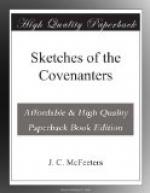Hamilton announced his intention to enter Edinburgh, as the king’s High Commissioner, on the 19th of June. Less than four months previous, the Covenant had been renewed in that city amid transports of joy; must it now be trampled in the dust? The effects of the Covenant had fallen upon the kingdom like spring showers that fill the land with songs and flowers; must the glory be blighted ere the fruitage be matured? The day set for the commissioner’s coming was perfect. The bright sun, clear sky, blue sea, green fields, purple hills, soft winds, fragrant blossoms, tuneful birds—all united to make the coming of his majesty’s commissioner a delight. Nature was in her gayest attire.
The road chosen for his journey to the city lay along the strand. He came in a stately carriage. His official dress was brilliant and imposing. His associates followed, while a strong military guard added dignity and a tinge of terribleness to the procession. It was Hamilton’s day of high honor. The proud sea rippled its welcome; the mellow winds floated the national emblem from many a window; the city was gaily decorated. The king’s sympathizers had done their best for the occasion, but the Covenanters had excelled them all.
The Covenanters were by no means ignorant of Hamilton’s power and purpose; yet they recognized him as the king’s representative, and therefore they would do him honor. They were truly loyal. No taint of treason had ever mingled in their blood. They resolved to give the commissioner every opportunity to do his duty as ruler, yet stood ready to resist if he did wrong. They came to the city in force; their number was estimated at sixty thousand. They thronged the road over which Hamilton passed, banked the hillsides with earnest faces, raised their caps in sincere respect for the commissioner, and lifted up their voices in prayer for their king and their country. When Hamilton saw the great-heartedness of the people, whom he came to crush, he wept.
The Covenanters had requested two things: a free General Assembly and a Parliament. The Church must have the first; the nation must have the second. The commissioner, in the name of the king, refused both. King James had abolished the General Assembly in 1618; there had been none for twenty years. The Covenanters, braving the king’s wrath and the commissioner’s power, appointed a meeting of ministers and elders to be held in Glasgow, November 21, 1638, five months hence, to re-organize the General Assembly. A cloud of war immediately darkened the heavens. Had the king’s wrath been lightning, the meeting-place would have been struck; but his rage was impotent.
[Illustration: Archibald Johnston.
Known also as Lord Warriston. He took a prominent part in the renewing of the Covenant in 1638; was chosen Clerk of the General Assembly, that same year, and continued in this office several years. He was an able defender of the Covenanted Church. He attained also to high earthly honors, yet held fast his integrity, and, when far advanced in years, suffered martyrdom for adherence to the cause of Christ and His Covenant.]




